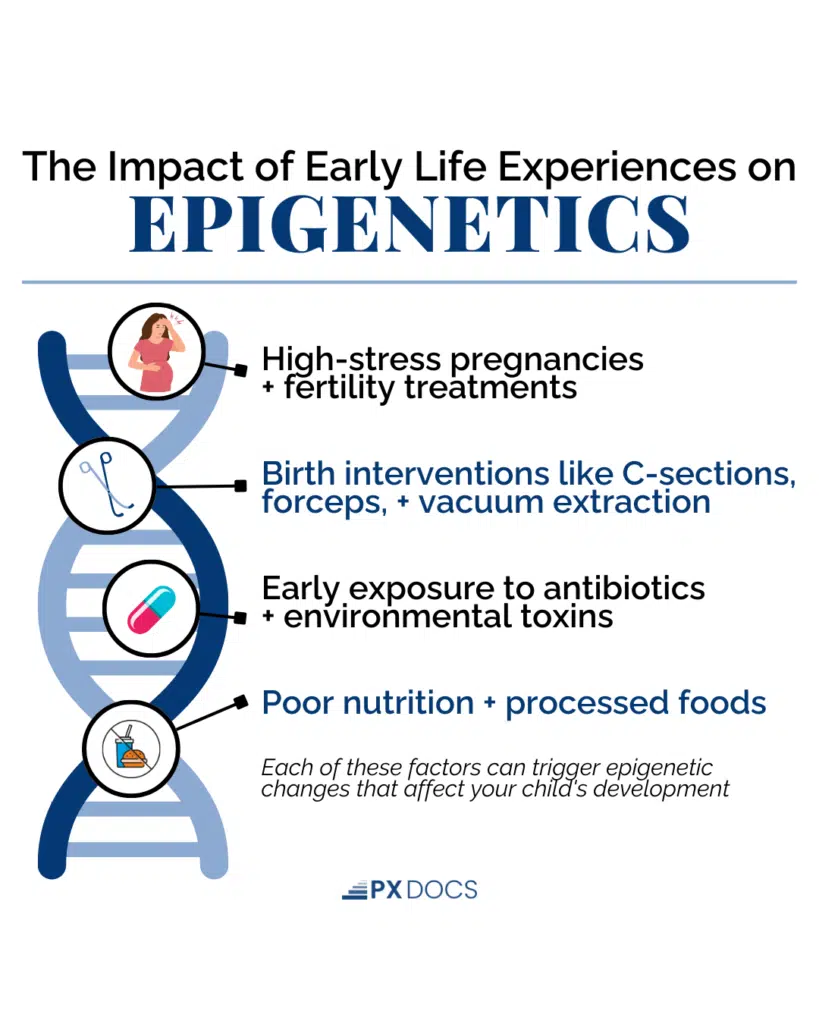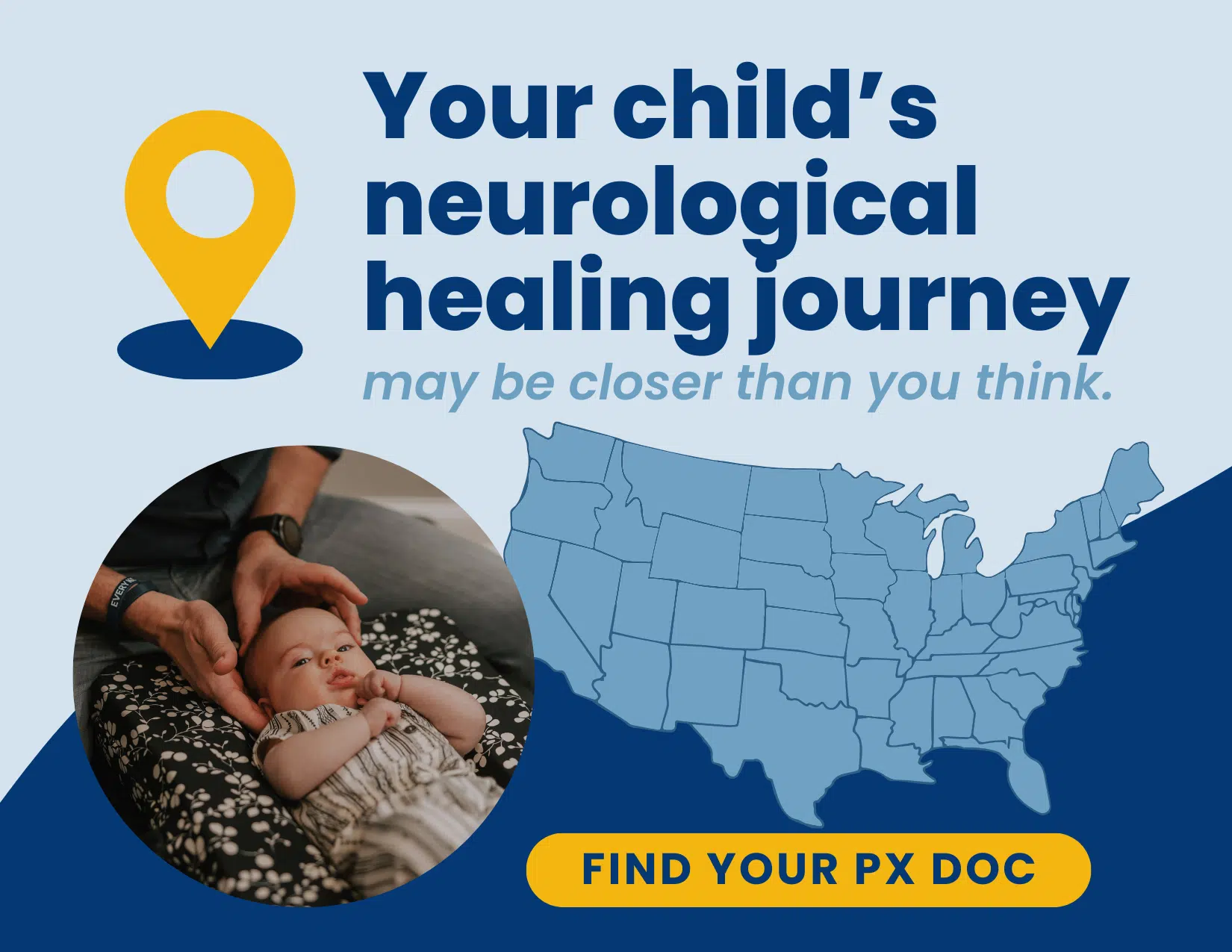As a parent, you want nothing more than for your child to grow up healthy, happy, and thriving. However, despite your best efforts to provide a nurturing environment and make healthy choices, you may grapple with concerns about your child’s well-being. Perhaps they struggle with chronic allergies, behavioral challenges, or developmental delays, leaving you feeling overwhelmed and unsure of where to turn for answers.
For most parents whose children struggle with serious neurological conditions like Autism Spectrum Disorder, ADHD, and Epilepsy, they’re told by the conventional medical system that these conditions are purely genetic and that there is not much they can do other than medications to help them.
But what if there is an underlying factor that influences your child’s health and development that you may not have considered, and that conventional pediatricians and medical doctors aren’t even up to speed on? Enter epigenetics—the fascinating field of neuroscience exploring how our experiences and environment can shape how our genes are expressed without changing the DNA sequence itself.
By understanding the role of epigenetics in pediatric health, you can gain valuable insights into how your child’s early life experiences, both in utero and during the critical years of development, can profoundly impact their long-term well-being. With this knowledge, you’ll be better equipped to make informed decisions and take proactive steps to support your child’s optimal health and development.
What is Epigenetics?
Epigenetics is the study of changes in gene expression that do not involve alterations to the underlying DNA sequence. In other words, it explores how our genes can be turned “on” or “off” in response to various factors, such as our diet, stress levels, and environmental exposures, without actually changing the genetic code itself.
To better understand epigenetics, let’s consider an analogy. Imagine your child’s DNA as a cookbook containing all the recipes (genes) needed to create a delicious meal (a healthy, functioning body). Epigenetics acts like sticky notes or bookmarks placed throughout the cookbook, marking which recipes should be used more often, which should be used sparingly, and which should be skipped altogether. These “epigenetic marks” can be added or removed based on various influences, ultimately determining which genes are expressed and to what extent.
Two of the most well-studied epigenetic modifications are:
- DNA methylation: This process involves attaching small chemical tags called methyl groups to specific locations on the DNA, which can silence or reduce gene expression.
- Histone modifications: Histones are proteins that act as spools around which DNA winds. Chemical modifications to histones can affect how tightly or loosely DNA is wrapped, influencing gene accessibility and expression.
Collecting all these epigenetic marks across the genome is known as the epigenome. The epigenome plays a crucial role in regulating gene expression, allowing cells with identical DNA to differentiate into various cell types and perform distinct functions.
Epigenetic modifications also illuminate the long-standing nature vs. nurture debate, demonstrating that it’s not an either/or proposition. While our genes provide the blueprint for our development, epigenetics reveals how our experiences and environment can shape how those genes are expressed, ultimately influencing our health and well-being.
The Impact of Early Life Experiences on Epigenetics
Epigenetic changes occur throughout our lives, but some of the most influential alterations occur during critical developmental periods, particularly in utero and early childhood. These early life experiences can profoundly impact your child’s epigenome, setting the stage for their long-term health and well-being.
“The Perfect Storm” concept, often referred to by PX Docs, describes the accumulation of environmental stressors that can disrupt normal development. These stressors include:
- Fertility challenges and interventions
- Maternal stress and anxiety during pregnancy
- Birth interventions, such as C-sections, forceps, or vacuum deliveries
- Exposure to toxins, such as pollution or cigarette smoke, and also pesticides, preservatives, and other toxic chemicals in our food supply, household products, and daily environment
- The overuse and misuse of antibiotics
- Poor nutrition, including a diet high in processed foods and low in essential nutrients
When these stressors combine, they can create a “Perfect Storm” that alters your child’s epigenome and neurological development, potentially leading to health challenges later in life.

Is Autism Genetic?
Research has shown that epigenetic changes can contribute to the development of various chronic diseases, such as:
- Autism: Studies have found that prenatal stress and certain environmental factors can lead to epigenetic changes associated with an increased risk of genetic autism spectrum disorders.
- ADHD: Epigenetic alterations have been implicated in the development of attention-deficit/hyperactivity disorder (ADHD), with factors such as maternal stress and exposure to toxins potentially playing a role.
- Allergies and autoimmune disorders: Early life experiences, including mode of delivery, antibiotic use, and diet, can influence the development of the immune system through epigenetic mechanisms, potentially contributing to the rise in allergies and autoimmune disorders.
By understanding the impact of early life experiences on your child’s epigenome, you can take proactive steps to minimize exposure to environmental stressors and provide a nurturing, supportive environment that promotes optimal health and development.
The Conventional Approach to Pediatric Health
Many parents turn to conventional medicine for answers when faced with pediatric health challenges. However, the conventional approach often focuses on treating symptoms rather than addressing the underlying root causes of health issues. This can lead to an overreliance on medications and interventions that may provide temporary relief but fail to promote long-term health and well-being.
Conventional medicine often views the body as a collection of separate systems rather than recognizing the intricate connections between the nervous system, immune system, and other vital functions. As a result, treatments may target specific symptoms without considering the broader impact on a child’s overall health.
And finally, conventional pediatricians and medical providers have far less understanding and experience with the latest in neuroscience such as the science of neuroplasticity, nervous system dysregulation, and epigenetics. This leaves them relying on outdated scientific approaches that the entire medical system was built upon decades ago.
While conventional approaches are useful in addressing acute illnesses and emergencies, they may fall short in supporting optimal health and development, particularly when it comes to preventing and managing chronic conditions rooted in epigenetic changes and nervous system dysfunction.
The PX Docs Approach: Neurologically-Focused Chiropractic Care + Holistic Healthcare
At PX Docs, we take a different approach to pediatric health. We focus on identifying and addressing the root causes of health issues through Neurologically-Focused Chiropractic Care. We recognize the central role of the nervous system in regulating all aspects of your child’s health and development, and we work to optimize its function through gentle, precise adjustments.
Three key concepts in our approach are subluxation, nervous system dysregulation, and dysautonomia:
- Subluxation refers to disrupted communication and altered neurological function within the neurospinal system.
- Nervous system dysregulation refers to a state of imbalance or dysfunction within the body’s central control network or central and autonomic nervous system.
- Dysautonomia describes an imbalance in the autonomic nervous system, which controls involuntary functions like heart rate, digestion, and immune response.
By addressing subluxation, dysregulation,and dysautonomia through this specialized form of chiropractic care, we help restore balance to the nervous system, allowing the body to function as it should. This is particularly important for the vagus nerve, a key component of the parasympathetic nervous system that is vital in regulating inflammation, digestion, and emotional well-being.
Our approach differs from conventional medicine in that we don’t just treat symptoms; we support the body’s innate healing capacity by removing interference in the nervous system. And unlike other natural health approaches that may focus solely on nutrition or detoxification, we recognize that lasting health begins with a well-functioning nervous system.
Optimizing Your Child’s Health and Development: Action Steps for Parents
As a parent, you play a crucial role in optimizing your child’s health and development. Here are some action steps you can take to support your child’s well-being:
- Reduce exposure to environmental stressors: Minimize your child’s exposure to toxins, such as pollutants and cigarette smoke, and choose organic, whole foods whenever possible.
- Provide a nurturing, supportive environment: Foster a loving, low-stress home environment that supports your child’s emotional and physical well-being.
- Seek Neurologically-Focused Chiropractic Care: Find a PX Docs practitioner near you and schedule a consultation to learn how our approach can benefit your child’s development and overall quality of life.
- Embrace a holistic approach to health: Recognize that your child’s physical and mental health is influenced by a complex interplay of factors, including nutrition, exercise, sleep, and stress management. Work with your PX Docs practitioner to develop a comprehensive plan that supports your child’s overall well-being.
By taking a proactive, informed approach to your child’s health, you can help them build a strong foundation for a lifetime of vitality and resilience.
Invest In Your Child’s Future
Epigenetics reveals that our health and well-being are shaped by a complex interplay of genetic predisposition and environmental influences, particularly during the critical periods of development in utero and early childhood. By understanding the role of epigenetics in pediatric health, you can make informed decisions that support your child’s optimal growth and development.
At PX Docs, we’re committed to addressing the root causes of health issues through Neurologically-Focused Chiropractic Care. Our approach recognizes the central role of the nervous system in regulating all aspects of your child’s health, and we work to optimize its function through gentle, precise adjustments that restore optimal function and regulation that builds up due to our toxic environment and stressful lifestyle.
If you’re concerned about your child’s health or development, we encourage you to visit the PX Docs directory and schedule a consultation with one of our skilled practitioners. Together, we can help your child unlock their full potential for a lifetime of health and well-being.
Remember, your child’s health is a journey, and every step you take to support their optimal development is an investment in their future. With the power of epigenetics and neurologically-focused care, you can give your child the best possible start in life.





